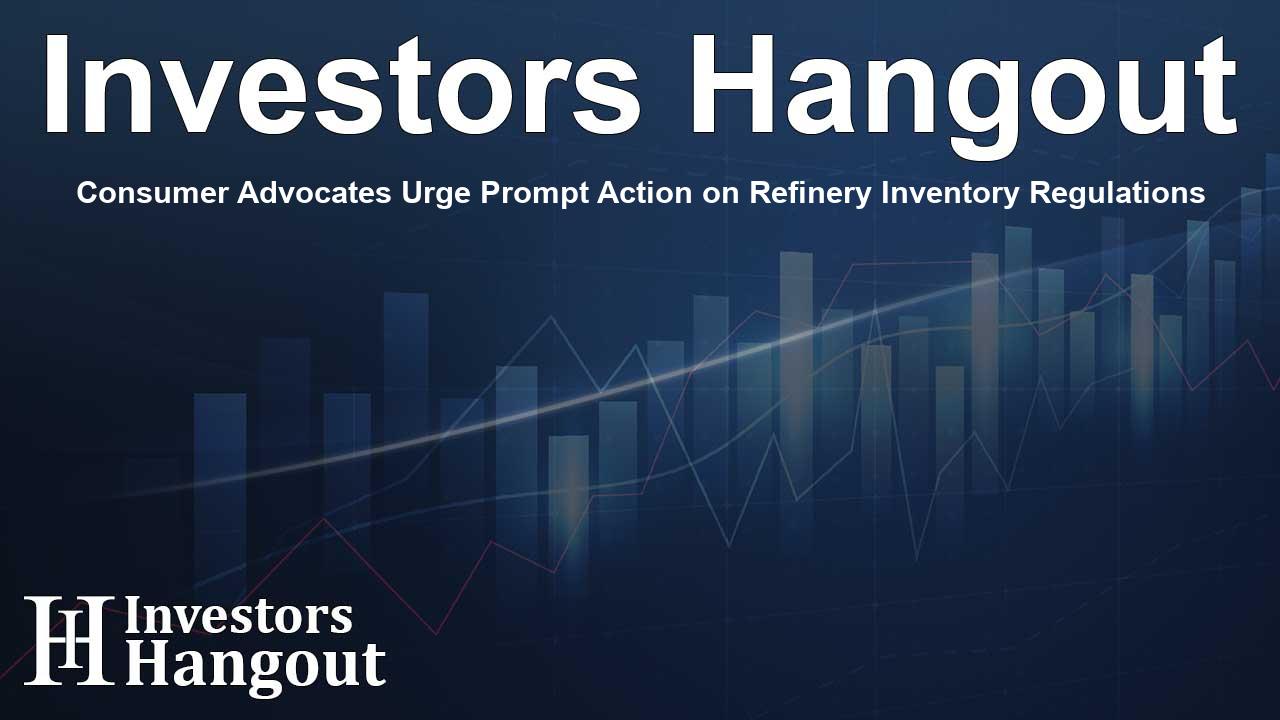Consumer Advocates Urge Prompt Action on Refinery Inventory Regulations

Urgent Call for Refinery Regulations in California
Consumer Watchdog has raised a crucial issue regarding the California Energy Commission (CEC) and the necessity for immediate regulations on refinery inventory and resupply rules. This call follows the recent explosion at the Chevron El Segundo refinery, highlighting vulnerabilities in the current system. The organization stresses that California residents are unprotected against sudden spikes in gasoline prices, which can occur after refinery outages.
Importance of Minimum Inventory Standards
In their correspondence to the CEC, Consumer Watchdog pointedly articulated that Californians lack essential protections due to the absence of rules that compel oil refiners to maintain minimum fuel inventories. The organization cited that during a special session convened by Governor Newsom to address this situation, it was clear that stronger regulation was needed urgently. Yet, despite the urgency of this matter, there has been insufficient action from the commission.
Statistics Highlighting Inventory Risks
Research referenced in the comments shows that gasoline prices tend to spike when supply drops below 15 days. The data reveal a compelling correlation between minimal supply days and increased fuel costs. Consumer Watchdog contends that straightforward regulations mandating minimum supply inventories are essential to prevent such price surges, especially after disasters like the recent refinery fire.
Necessity of Quick Implementation
The comments further emphasized the necessity for the CEC to expedite the process of creating these regulations. They argue that if the situation was dire enough to warrant a special legislative session, then it is equally critical to fast-track the necessary rules to implement Governor Newsom's directives from the previous year.
Financial Implications of Inventory Management
According to estimates provided by the CEC Vice Chair, Siva Gunda, maintaining a slightly higher inventory could significantly mitigate potential consumer costs. The estimated financial outlay for refiners to comply with new regulations would be around $20 million to $25 million, which pales in comparison to the billions of dollars in consumer costs that could arise from inadequate inventories during demand surges. This represents a sound economic decision for the industry and consumers alike.
Global Benchmarking of Inventory Regulations
The conversation around refinery inventory is not limited to California. Consumer Watchdog noted that other nations have long implemented regulations requiring substantial minimum stockpiles at refineries. Countries like Australia have proven that effective rules can be established, ensuring adequate fuel supplies while stabilizing consumer prices.
Proposed Solutions for Refinery Operations
Consumer Watchdog argues that there is no requirement for additional storage construction to meet these proposed regulations. Current refinery operations indicate that storage capacity is underutilized, and additional stocks could be accommodated without compromising functionality. Thus, these measures would enhance operational stability while providing essential safeguards for consumers.
Conclusion: A Call to Action
In conclusion, the evidence presented to the CEC makes a compelling case for swift regulatory action regarding refinery inventories. As Californians face the challenges of fluctuating fuel prices and uncertain supply chains, it is imperative that measures are put in place to secure a reliable, fair fuel market that protects the interests of consumers.
Frequently Asked Questions
Why is Consumer Watchdog urging the CEC to act?
They are advocating for regulations that mandate minimum refinery inventories to protect Californians from volatile gas prices following recent refinery incidents.
What are the risks associated with low inventories?
Low inventories lead to price spikes at the pump, significantly impacting consumers. Historical data indicates that supply issues can correlate directly with increased fuel costs.
How can regulations benefit consumers?
Regulations would ensure that refiners maintain adequate inventories, thus stabilizing prices and preventing inflated costs during supply shortages.
What examples exist of other countries with similar regulations?
Countries such as Australia, France, and South Korea currently have established regulations requiring minimum fuel inventories at refineries to uphold supply security.
Are there financial implications for refiners with these regulations?
Implementing minimum inventory regulations is expected to involve relatively modest costs for refiners compared to the potential financial burden on consumers during shortages.
About The Author
Contact Ryan Hughes privately here. Or send an email with ATTN: Ryan Hughes as the subject to contact@investorshangout.com.
About Investors Hangout
Investors Hangout is a leading online stock forum for financial discussion and learning, offering a wide range of free tools and resources. It draws in traders of all levels, who exchange market knowledge, investigate trading tactics, and keep an eye on industry developments in real time. Featuring financial articles, stock message boards, quotes, charts, company profiles, and live news updates. Through cooperative learning and a wealth of informational resources, it helps users from novices creating their first portfolios to experts honing their techniques. Join Investors Hangout today: https://investorshangout.com/
The content of this article is based on factual, publicly available information and does not represent legal, financial, or investment advice. Investors Hangout does not offer financial advice, and the author is not a licensed financial advisor. Consult a qualified advisor before making any financial or investment decisions based on this article. This article should not be considered advice to purchase, sell, or hold any securities or other investments. If any of the material provided here is inaccurate, please contact us for corrections.
